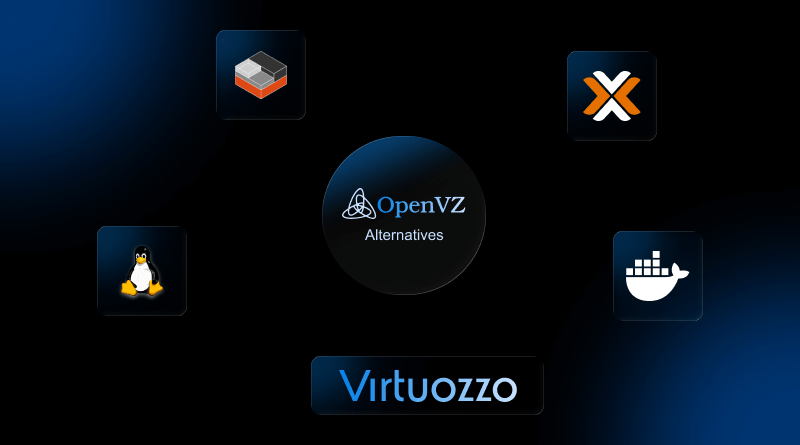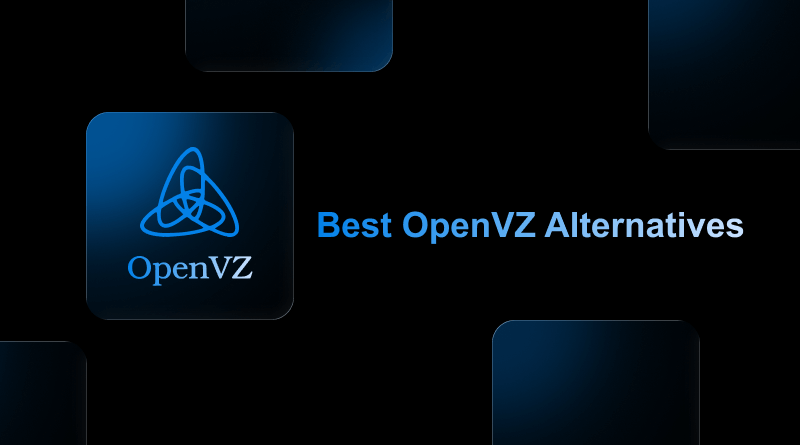“The Golden Age of OpenVZ is over.”
While OpenVZ made cheap VPS hosting possible, its shared kernel now puts it at a competitive disadvantage. The OpenVZ container-based virtualization system has been popular for years because of its dependable performance, particularly in the VPS hosting industry. OpenVZ operates several isolated containers, also known as virtual environments, on a single host with a shared Linux kernel. Its minimal design with less overhead has made OpenVZ a popular option amongst developers and web hosting companies, providing optimal high-density VPS.
OpenVZ is the ultimate in container Linux hosting. However, OpenVZ has its limitations. Due to the shared kernel, there is a lack of flexibility in running various Linux kernels, components, or system configurations, and custom controls for each container. Furthermore, with modern virtualization features in Linux and on hardware, more containerization technologies are available than OpenVZ, which was built for legacy virtualization. Containerization technologies provide improved isolation, security, and long-term support compared to OpenVZ.
This is why, in the following comparisons, we will analyze OpenVZ against its best available alternatives on various versions of Linux, including Arch Linux, focusing on resource management, performance, and enterprise capabilities. The hosting market is highly competitive, and OpenVZ is losing its competitive advantage rapidly. OpenVZ is no longer an ideal solution. Understanding the best alternatives is crucial for cloud VPS hosting.
Useful Read: Difference in between KVM and OpenVZ Virtualization
Table Of Content
What is OpenVZ?
OpenVZ is an open-source, container-based virtualization platform built for Linux operating systems. Unlike traditional hypervisors that emulate hardware for every virtual machine, OpenVZ uses a shared kernel architecture and allows multiple, isolated containers. These containers that are often referred to as Virtual Private Servers (VPS), operate on a single physical server. OpenVZ is a container-based virtualization technology, meaning that each container is able to act like a separate computer with its own processes, users, file systems, and network interfaces, while still sharing the same kernel and underlying Linux operating system.
OpenVZ is lightweight and has great performance since most system resources are saved, and processing speeds are nearly identical to the primary server (or bare-metal speeds). This characteristic is what most hosting companies that offer virtual server environments appreciate, as OpenVZ is able to accommodate varying customer needs with lightweight web application environments requiring rapid scaling with minimal system overhead.
Why Do People Look for OpenVZ Alternatives for VPS?
OpenVZ is becoming less appealing for modern cloud services because its shared kernel architecture is a limitation. Because all containers depend on the same Linux kernel, clients are unable to run different kernel versions and are unable to make different, system-related changes within a single container. This creates a lack of flexibility and is problematic for developers operating diverse systems.
The lack of security and isolation is another drawback. Containers sharing the same kernel means the vulnerability of one can expose the rest to risks on the same node. In newer virtualization technologies, LXC/LXD and KVM, isolation is stronger, and protection of multi-tenancy environments is enhanced.
Moreover, the slower development pace of OpenVZ and its limited compatibility with modern orchestration systems (particularly Kubernetes) are additional reasons contributing to its diminishing suitability for today’s automated and scalable infrastructures. Containers also generate “noisy neighbors” that negatively impact performance for other containers.
Top 5 OpenVZ Alternatives (Detailed Comparison)
OpenVZ was the beginning of effective container-based virtualization. However, modern infrastructures need more flexibility, better isolation, and greater compatibility. These are some top replacements for OpenVZ with improved scalability, performance, and management capabilities that are aligned with contemporary VPS and enterprise environments.

1. OpenVZ Alternative: LXC/LXD
- Ideal for: Developers and System Administrators in need of secure, lightweight containers with the full functionality of an entire Linux OS.
- OpenVZ vs. LXC/LXD: OpenVZ may have containers that run different Linux distributions and kernel versions, but LXC (Linux Containers) and LXD (Linux Daemon) containerization systems are way more advanced. Containers provide exceptional separation and more effective cgroup-controlled resource distribution and are closely linked with orchestration systems like Kubernetes. The LXD web interface and the REST API make management effortless in what is, in many areas, modern containerization, which is an effective alternative to OpenVZ.
2. OpenVZ Alternative: KVM (Kernel-based Virtual Machine)
- Ideal for: Enterprises and hosting providers in need of full virtualization/independent kernel access.
- OpenVZ vs. KVM: KVM has the ability to create independent virtual machines with their own dedicated resources and full OS control, while OpenVZ works with a shared kernel. This means different types of operating systems (Linux, Windows, and BSD) can run, and it offers more powerful isolation and more robust security. Businesses that need stability and consistent performance will benefit from KVM-based VPS hosting.
Similar Read: Top KVM Alternatives
3. OpenVZ Alternative: Proxmox VE
- Ideal for: Businesses and data centers that need an all-in-one virtualization and container management platform.
- OpenVZ vs. Proxmox VE: Both KVM virtualization and LXC container management, Proxmox offers excellent integration. Proxmox presents simplified integration with scheduled backups and user-defined clusters with built-in monitoring! OpenVZ lacks these features outright. Proxmox VE is one of the best VPS hosting alternatives to OpenVZ and is perfect for hosting providers who want seamless control with open-source flexibility. Proxmox VE enables hybrid deployments of containers and virtual machines.
4. OpenVZ Alternative: Docker
- Ideal for: Developers focusing on portable, microservice-based applications.
- OpenVZ vs. Docker: Unlike OpenVZ, which provides a system container, Docker pivots around application-level containerization. This enables developers to package their applications and effortlessly deploy them across various environments. Docker containers are excellent for continuous integration and continuous deployment (CI/CD) pipeline orchestrations and microservice architectures. While it lacks VPS hosting capabilities (and is not a direct replacement), it is the most containerized technology that OpenVZ inspired.
5. OpenVZ Alternative: Virtuozzo
- Ideal for: Enterprises requiring commercial-grade support with OpenVZ-like performance.
- OpenVZ vs Virtuozzo: Virtuozzo is OpenVZ’s enterprise-grade successor built by the same team. It comes with commercial support, more features, a natively separate kernel, live migration, and high availability. It is easy for businesses using OpenVZ to move to Virtuozzo if they require more advanced features and support.
Comparison of the OpenVZ Alternatives for VPS and Containerization
| Virtualization Platform | Type | Kernel Isolation | OS Support | Ease of Management |
| OpenVZ | Container-based | Shared | Linux only | Basic CLI tools |
| LXC/LXD | Container-based | Independent | Multiple Linux distros | Easy (CLI + Web UI) |
| KVM | Full virtualization | Full isolation | Linux, Windows, BSD | Moderate |
| Proxmox VE | Hybrid (KVM + LXC) | Full + Partial | Linux, Windows | Very Easy (Web UI) |
| Docker | Application containerization | Process-level | Cross-platform | Easy (CLI + Docker Hub) |
| Virtuozzo | Container-based (Commercial) | Independent | Linux, Windows | Easy (GUI + API) |
OpenVZ was great for container-based virtualization for a long time. However, the modern hosting world has become more flexible, and the shared kernel architecture has limited OpenVZ’s practicality. Modern container and virtualization technologies, such as LXC/LXD, KVM, Proxmox VE, and Docker, provide more advanced isolation, security, and performance than OpenVZ.
When deciding on the best OpenVZ replacement, think about your use case. Do you need full hardware virtualization (KVM), lightweight containers with more isolation (LXC/LXD), or a unified management solution (Proxmox VE)? Each of these alternatives to OpenVZ comes with better kernel independence, more active community support, and greater scalability.
Today, using modern container technologies as an alternative to OpenVZ provides long-term viability, flexible resource allocation, better integration with orchestration, and control over cloud server and VPS hosting. These features provide secure and efficient virtual environments.
FAQs
1. Is there a supportive and active development-free alternative to OpenVZ?
Indeed, one of the nicer opportunities available is LXC/LXD. It is an open-source alternative to OpenVZ. It is supported by the Canonical Company and has a decent-sized active community. LXC/LXD has improved kernel independence and can be integrated with modern container management technologies, along with more frequent updates than OpenVZ.
2. What are the security weaknesses OpenVZ has due to shared kernel infrastructure?
The more serious vulnerability is the fact that all containers use a single Linux kernel. If a single container is compromised, kernel exploits can be triggered, and all the compromised containers can be controlled by the attacker. Thus, OpenVZ provides for a riskier environment than KVM hypervisors, as there are no isolated kernels for each virtual machine.
3. How does OpenVZ resource isolation (CPU, RAM) differ from KVM or LXC/LXD?
Resource isolation with OpenVZ is more lenient, which results in possible uneven performance due to the fact that all the containers share the kernel. On the other hand, through KVM and LXC/LXD, more robust resources with isolation are possible as stable RAM and CPU are guaranteed to each environment.
4. Do modern alternatives like LXC still suffer from the “noisy neighbor” issue common in OpenVZ?
Modern technologies in containers like LXC/LXD have almost completely solved the “noisy neighbor” problem due to the implementation of sophisticated cgroups and namespaces. With these technologies, fair resource distribution is guaranteed, and LXC environments become far more stable and predictable than OpenVZ.














